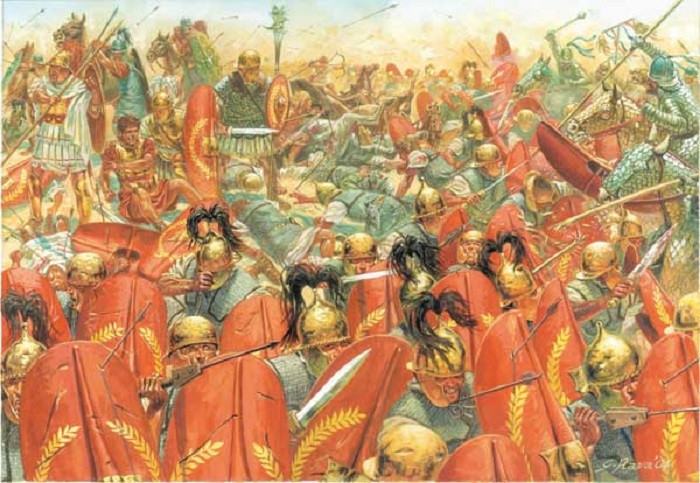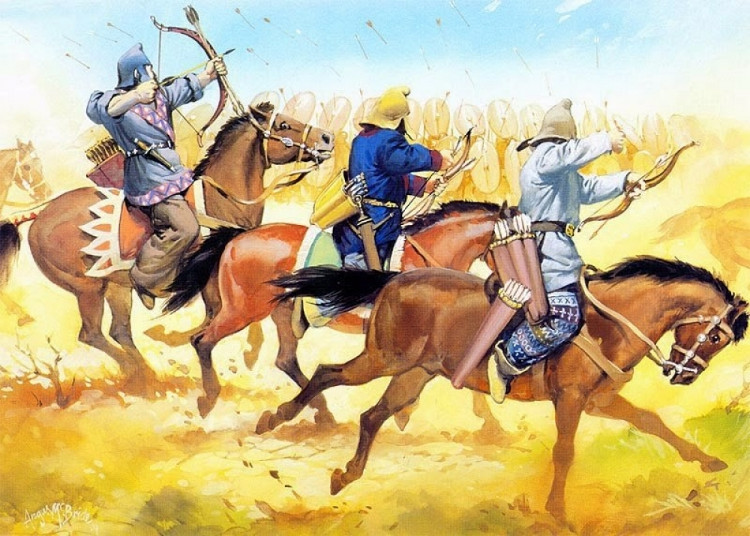Roman army defeated 8,000km lost to China?
The 40,000-strong Roman army in the battle to expand the east to the east, is believed to have once lost as much as 8,000 kilometers, living in a remote Chinese village.
The Romans during the BC era built one of the most powerful empires in history.
In 53 BC, the Roman army under the command of the richest man of Rome, wanted to expand control of the empire to Parthia (Iran today) , according to War History Online.

The Roman army was defeated before the Parthian Empire when it expanded to the east.
The campaign was unilaterally conducted by Marcus, without permission and approval from the Roman parliament.
The battle was defeated
The Roman army commanded by Marcus traveled far east, to Harran in southeastern Turkey, encountered the Surena-led Parthia in Carrhae in May 53 BC
Initially, Marcus's army was traditionally arranged. But due to crossing the river, most of the formation shrinks into square clusters.
General Surena cleverly hid the cavalry, the true power of the Parthian Empire and left only a handful of troops ahead with the aim of luring Marcus through the river.
Surena's body with a large and powerful body led the cavalry to attack the Romans. At this time, although there were fewer troops, the Parthian cavalry combined with archers fought very effectively. Thousands of names shot out, causing the Roman army to have no chance to resist.
At this point, Marcus was forced to order Publius's son to bring about 4,000 troops to fight diversionary attacks, to aggressively attack the main forces to counterattack.

The Parthian cavalry, both riding and archery, caused heavy losses to the Romans.
However, the Pathian army was so alert, they knew how to retire in time to encircle the small army. The army of 4,000 people and Publius defeated the Parthian army.
In the face of miserable defeat, Marcus tries to bring his troops back to the Allied territory. But the Romans were utterly defeated, three-fourths of Marcus's troops were wiped out after Carrhae. 10,000 survivors were taken prisoner and forced to work hard.
Lost to China
The Parthians have a tradition of capturing prisoners' lives, reforming them into border guards. The remaining 10,000 Roman troops were taken to the eastern front.
Here, the Romans had no chance of fleeing because they were thousands of kilometers away from their homeland. Most accept the new life.
Several years later, the Parthians clashed with Chinese troops in a border town today in Taraz, Kazakhstan, bordering Kyrgyzstan.
Chinese historians describe the clash in the small village very fierce, but the Chinese won the final victory. China under the Han Dynasty was at the height of prosperity, constantly expanding its land to the west. Many Parthians defected to China, including the ancient Roman army.
The Chinese were so impressed with Roman warriors that they entrusted them to guard another border town, this time bordering China and Tibet.

The Roman army spent an 8,000km journey to live in a remote village in China.
It is estimated that about 1,000 Romans live and guard in the village of Liqian (meaning the legions, quite popular phrases of the Romans). These men knew how to use many tools and turned the area into a fortified fortress, which was quite popular in the Mediterranean, but very rare in Asia.
Roman people lived peacefully in Liqian for the rest of the time. 2,000 years later, the scientific community demonstrated that 50% of the DNA samples of the local people living here had ancestors who were white, blue-eyed and of superior height. They also have many identities similar to the Romans.
People living in this small village seem to be proud of their origins, often holding Roman festivals and worshiping bulls and mascots of the Roman army.
However, many historians today reject this story. They claim that the village of Liqian is located near the famous, so the white origin of the DNA may originate from the resting merchants.
Chinese archaeologists today have also found no evidence, such as Roman coins and artifacts in Liqian. But if this hypothesis is correct, the story of the Roman legion being defeated lost to 8,000km, to the piece of Chinese land to live and start a career is astonishing.
- Why was the Roman empire destroyed? (part II)
- Evidence shows that Roman soldiers went to war in China?
- 13 most powerful military forces in the history of the ancient world
- Where did the ancient Gladius sword of ancient Rome come from?
- Discover the ancient Roman military road
- The death penalty of nearly 1,000 Jews before 5,000 Roman soldiers in 70
- Emotional letter of ancient Roman soldier from 1,800 years ago
- Finding Napoleon lost the match in Russia for unexpected reasons!
- The most powerful Empire ever defeated the Roman Empire and ended after 'bullying' Russia
- Hoplite - The most powerful army in Greek history
- Battlefields where Emperor Caesar massacred 150,000 people
- Why did the Vietnamese defeat the powerful army of Qin Shihuang?
 'Fine laughs' - Scary and painful torture in ancient times
'Fine laughs' - Scary and painful torture in ancient times The sequence of numbers 142857 of the Egyptian pyramids is known as the strangest number in the world - Why?
The sequence of numbers 142857 of the Egyptian pyramids is known as the strangest number in the world - Why? History of the iron
History of the iron What is alum?
What is alum?